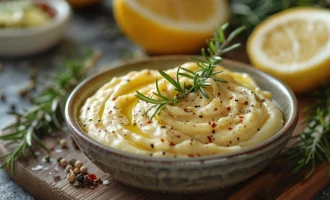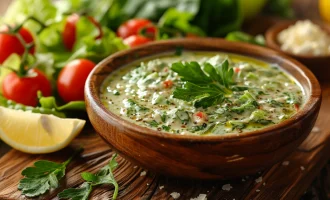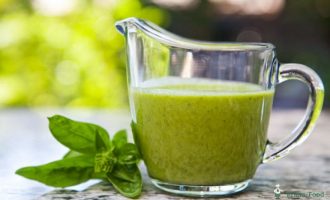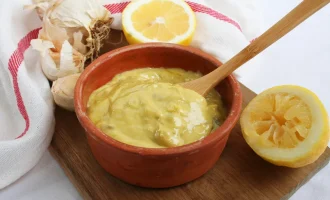Hollandaise sauce, a cornerstone of French cuisine, is a rich and buttery sauce with a smooth, creamy texture. This luxurious sauce dates back to the 17th century and is one of the five mother sauces in French gastronomy. Traditionally served with eggs Benedict, asparagus, and fish, hollandaise sauce adds a touch of elegance and flavor to a wide range of dishes. Its emulsification of egg yolks and melted butter, seasoned with lemon juice, salt, and a little cayenne or white pepper, results in a uniquely tangy and velvety sauce.
- Egg yolks 60 g
- Fresh lemon juice 15 g
- Cold water 15 g
- Unsalted butter 225 g
- Salt a pinch
- Cayenne pepper a pinch
- Separate the egg yolks into a heatproof bowl. Have all other ingredients measured and ready to use. Cut the butter into small pieces and melt gently; it should be warm, not hot.
- Add the lemon juice and cold water to the egg yolks. Whisk until the mixture is light and frothy.
- Place the bowl over a pot of simmering water (double boiler setup). Ensure the bottom of the bowl does not touch the water. Whisk the egg yolk mixture constantly and vigorously.
- Continue whisking until the mixture thickens to a “ribbon stage,” where it’s thick enough to leave a trail when the whisk is lifted.
- Remove the bowl from the heat. Slowly drizzle in the melted butter while whisking continuously, until the sauce thickens and doubles in volume.
- Season with salt and a pinch of cayenne or white pepper. Adjust lemon juice to taste.
- Hollandaise sauce should be used immediately or kept warm for a short period, as it does not reheat well.
Storage Tips
Hollandaise sauce is best enjoyed fresh and does not store well due to its delicate emulsion. If absolutely necessary, it can be kept warm for about an hour over a pan of lukewarm water. Stir occasionally to prevent a skin from forming.
Useful Properties of the Main Ingredient
Eggs, the main ingredient in hollandaise sauce, are highly nutritious, providing high-quality protein, vitamins A, D, E, and B12, antioxidants, and choline, which supports brain health.
Interesting Facts about the Sauce
- Culinary Pedigree: Hollandaise is one of the French cuisine’s “mother sauces,” a foundational element in many recipes.
- Misnomer: Despite its name, hollandaise sauce is not from Holland. The name is believed to have originated because it was made with butter and eggs, products for which the Dutch were famous.
- Versatility in Variations: By adding different herbs, spices, or other flavorings, hollandaise can be transformed into a variety of sauces, such as Béarnaise (adding tarragon and shallot reduction) and Mousseline (adding whipped cream).
Hollandaise sauce’s rich flavor and creamy consistency make it a beloved addition to many dishes, embodying the finesse and flavor that define French cuisine.







